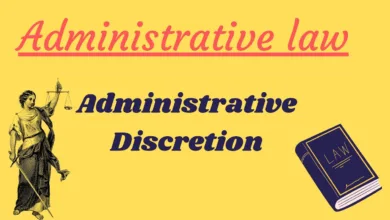Tribunals and Types of Tribunals in India- Law Notes

This article ‘Tribunals and Types of Tribunals in India’ provides an insightful exploration of tribunals in India, delving into their meaning, types, and significance in the legal landscape.
Tribunals in India: Meaning
The term ‘Tribunal’ derives from the word ‘Tribunes,’ which means ‘Magistrates of the Classical Roman Republic.’ The tribunal is referred to as the ‘Tribunes’ office, i.e., a Roman official under the monarchy and the republic to protect the plebeian citizen from the patrician magistrates ‘arbitrary action.
- Tribunals in India serve as administrative bodies entrusted with quasi-judicial duties, positioned between traditional courts and executive bodies.
- Originating from the Roman Republic’s ‘Tribunes,’ they aim to protect citizens from arbitrary actions of authorities.
- Their establishment addresses the need for justice amidst increasing state actions, ensuring timely resolution of disputes.
Important Types of Tribunals in India
There are mainly 2 types of tribunals in India, these are-
- Domestic Tribunals: Created under statutes, e.g., the Bar Council of India,and State Bar councils created under the Advocates Act, 1961.
- The ‘domestic tribunal’ refers to administrative structures designed to control professional conduct and impose discipleship among members through the exercise of investigative and adjudicative powers.
- Statutory Tribunal: Established under Articles 323-A and 323-B of the Constitution, e.g., Administrative Tribunals Act, 1985, for specific matters like service disputes. They operate outside traditional legal frameworks but uphold principles of natural justice.
Read Also: Notes of Administative Law
Difference between Tribunals and Courts
- Courts settle disputes definitively, ensuring fair proceedings and adherence to the law, whereas tribunals focus on specific statutory matters or administrative disputes.
- Courts are integral to the judicial system, safeguarding rights and delivering justice across civil, criminal, and high courts, while tribunals serve as specialized bodies resolving disputes arising from specific laws or administrative decisions.
The differentiation between a Court and a Tribunal lies in their approach to resolving disputes. As articulated in the case of Virindar Kumar Satyawadi v. Punjab State, the Supreme Court highlighted that a Court is tasked with settling disputes in a fair manner and delivering a final judgment that delineates the rights of the involved parties. This entails providing a platform for parties to present their arguments, submit evidence, and undergo a thorough review of facts in accordance with the law.
In ‘Union of India V. R. Gandhi’ (2010), the Supreme Court elaborated on the roles, establishment, and operations of both courts and tribunals, emphasizing their distinct functions. Courts, integral to the justice system, are mandated by the state to administer justice across civil, criminal, and high courts, safeguarding rights and resolving disputes.
Conversely, tribunals are specialized statutory bodies established to settle disputes arising from specific laws or administrative decisions. They may include private arbitral tribunals or those appointed or approved by law, staffed predominantly by judicial officers. Examples range from Rent Tribunals to Employment Courts, each addressing specific areas of dispute resolution.
In essence, while courts uphold the broader principles of justice across various legal domains, tribunals serve as specialized avenues for resolving specific disputes within defined legal frameworks.
| Daily current affairs Updates | Click Here |
| Law Notes Free Channel | Click Here |
Conclusion
Tribunals in India play a vital role in ensuring efficient dispute resolution, complementing the traditional judicial system. From domestic tribunals to statutory bodies, they provide specialized adjudication tailored to the demands of modern governance and justice.
References
- Walker, David M., Oxford Companion to Law, Oxford University Press, ISBN 0-19-866110-X, 1980 at p.1239
- Kagzi, M.C.J, The Indian Administrative Law, Metropolitan Book Co. Pvt. Ltd., Delhi, 3rd edn., 1973 at pp. 276 and 279
- Basu, Durga Das, Commentary on the Constitution of India, Lexis Nexis, New Delhi, 8th edn., 2011 at p. 10650; See also, State of West Bengal v. Kamal Sengupta, (2008) 8 SCC 612
- AIR 1997 SC 1125
- AIR 1956 SC 153
What is Tribunals in India?
The term ‘Tribunal’ derives from the word ‘Tribunes,’ which means ‘Magistrates of the Classical Roman Republic.’ The tribunal is referred to as the ‘Tribunes’ office, they aim to protect citizens from arbitrary actions of authorities. Read More
How Many Types of Tribunals in India?
There are mainly 2 types of tribunals in India, these are-
- Domestic Tribunals
- Statutory Tribunal
Difference between Tribunals and Courts in India
Courts are integral to the judicial system, safeguarding rights and delivering justice across civil, criminal, and high courts, while tribunals serve as specialized bodies resolving disputes arising from specific laws or administrative decisions.




